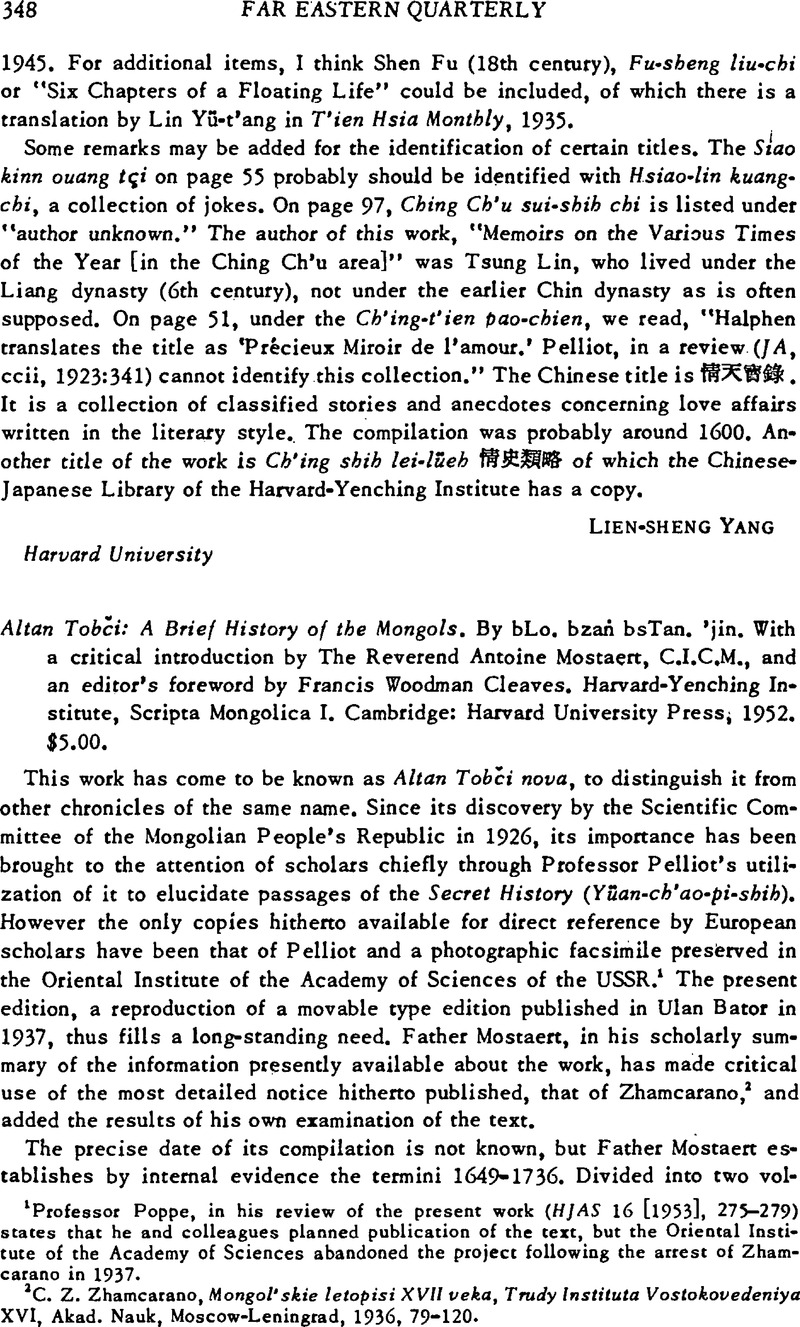No CrossRef data available.
Article contents
Altan Tobči: A Brief History of the Mongols. By bLo. bzaṅ bsTan. ‘jin. With a critical introduction by The Reverend Antoine Mostaert, C.I.C.M., and an editor's foreword by Francis Woodman Cleaves. Harvard-Yenching Institute, Scripta Mongolica I. Cambridge: Harvard University Press; 1952. $5.00.
Published online by Cambridge University Press: 23 March 2011
Abstract

- Type
- Book Reviews
- Information
- Copyright
- Copyright © Association for Asian Studies, Inc. 1954
References
1 Professor Poppe, in his review of the present work (HJAS 16 [l953], 275–279) states that he and colleagues planned publication of the text, but the Oriental Institute of the Academy of Sciences abandoned the project following the arrest of Zhamcarano in 1937.
2 Zhamcarano, C. Z., Mongol'skie letopisi XVII veka, Trudy Instituta Vostokovedeniya XVI, Akad. Nauk, Moscow-Leningrad, 1936, 79–120.Google Scholar
3 The text of this treaty (in the present edition, II, 191.3–192.6) is translated by Zhamcarano, op. cit., 119.
4 For comments on style and vocabulary supplementing those of Zhamcarano and Mostaert, see the above-mentioned review of Poppe.
5 Regarding the conspicuous lacuna on page 137, where Altan Tobči nova's version of YCPS 176 is immediately followed by that of YCPS 208, Zhamcarano has suggested (op. cit., 103) that it is due to the carelessness of a copyist, misled by the occurance of the name Jūrcedei both at the end of 176 and the beginning of 208 (YCPS text: Pelliot, Histoire Secrete des Mongols, 57, 90), and there may be, as Kozin says, copies which contain these paragraphs (Kozin, Sokrovenoe Skazanie, Moscow-Leningrad, 1941, 19; see also Pelliot, TP XXIX, 1932, 49.).
6 Op. cit., 91. Zhamcarano was nevertheless convinced that some material of *YCPS, lacking in YCPS, could be ascribed to the original, see Mostaert's Introduction, xiii, n. 7; also Zhamcarano, 99, where he refers to a passage of *YCPS (I, 48.9–10 of the present edition) which supplements YCPS 96.
7 See the works cited by Mostaert, xiii, n. 7, especially Mélanges Asiatiques I (= JA 232), 1940–41, 4, and Heissig, Bolur Erike, 42.
8 Kozin, op. cit., 18–22.
9 “A propos du mot lirolya de l'Histoire secréte des Mongols,” HJAS 12 (1949), 470–476; “Sur Quelques passages de l'Histoire secrete des Mongols,” HJAS 13 (1950), 285–362; suite: 14 (1951), 329–404; fin: 15 (1952), 285–408.
10 As Father Mostaert notes, some of these textshave been translated in whole or in part by Zhamcarano (op. cit.). For convenience of reference to the present edition of Altan Tobči nova, we list the following: I, 24.4-25.10 (Zh., 95 f.), 100.7–101.1 (Zh., 101), II, 86.10–91.11 (Zh., 114–117). Sayand Secen has versionsvof several of the episodes in question, e.g. 1) the miraculous nectar which only Cinggis could drink (II, 1.1-2-3; text in Schmidt's edition of Sayang Secen, 82.6-16); 2) Cinggis's condemnation and subsequent pardon of Aryason (II, 50.13-53.1; op. cit., 78.7-80.2); and 3) the lamentations of Toyon Temūr (II, 122.3-124.6; op. cit., 136.1–19).
Father Mostaert's second passage (I, 71.3–6), which is an interpolation in 'YCPS 123 and narrates the origin of Cinggis's seal and name, appears to be merely a summary of an earlier passage (I, 26.4-28.4), which M. does not include in this category. As regards the account of Qubilai's miraculous birth, and the death of his father Tolui by virtue of which Činggis was spared by Heaven (II, 76.6-78.1), we might note the conflict with YCPS 272 (Haenisch, Die Geheime Ceschichte der Mongolen, 137ff.), according to which Tolui sacrificed himself not for his father Činggis but for his elder brother Ögedei. This passage is doubtless of Qubilaid inspiration, like Cinggis's alleged designation of Qubilai as his eventual successor (Sayang Secen, 105; Vladimirtsov, Gengis Khan, French edition, Historical Introduction by Grousset, XIIIf.).




